Drivers injured and power cuts as Storm Éowyn hits Scotland
Drivers were injured, buildings were damaged and thousands of homes have been left without power as Storm Eowyn swept across Scotland.
One person was seriously hurt in a single vehicle collision in Mauchline, East Ayrshire at about 07:10 on Friday, while another was injured when a van was struck by a falling tree in Glasgow at about 09:00.
Almost 117,000 households are currently without power, while many transport services remain suspended.
A red weather warning for areas of central, southern and western areas expired at 17:00 but an amber wind alert remained overnight in northern Scotland.
Police Scotland said officers had responded to about 1,500 weather-related incidents by 18:00, while the Scottish Fire and Rescue Service had more than 300 callouts.
Police also investigated the death of a 49-year-old man who was found unresponsive on a street in Irvine, North Ayrshire, but it was believed to be non-suspicious and unrelated to the weather.
In an update issued at about 22:00, SP Energy Networks said it had restored power to 89,000 customers in southern and central Scotland, but 57,000 were still without supplies.
Forth Valley Royal Hospital was also affected by a brief power outage during the storm, but back-up generators were used.
SSEN, which covers the north of the country, said its engineers were working to reconnect nearly 49,000 customers.
At the peak of the storm a gust of 100.7mph was officially recorded at Drumalbin in South Lanarkshire while another of gust of 102mph was reported on the Tay Road Bridge.
People were urged against leaving their homes due to danger from flying debris, coastal overtopping, falling trees and damage to buildings.
Transport Scotland said the M9 had to be closed in both directions between J8 and 9 due to multiple fallen trees.
The A75 was shut between Gretna and Stranraer, and the A1 was also closed between the Spott Roundabout and Cockburnspath due to a "number of overturned vehicles".
Police Scotland also activated Operation Overflow to accommodate lorry drivers whose sailings from south west ports had been cancelled.
The Scottish government's resilience room met several times throughout the day to to assess the situation.
First Minister John Swinney said the utility companies were working at pace to restore power as quickly as possible.
But he said there had been "too many lorries on the road" and urged HGV drivers to heed police warnings not to travel.
Deputy First Minister Kate Forbes urged people to continue to take care as the red wind warning was downgraded to amber.
She told BBC Radio Scotland's Drivetime an amber warning was "still serious" and road users should heed the advice of police who continue to warn against travel.
Ms Forbes said the emergency services should not be put at risk after it emerged officers responded to at least 11 incidents of lorries overturning due to high winds.
The deputy first minister also told the programme no employer should put employees under pressure to ignore police advice.
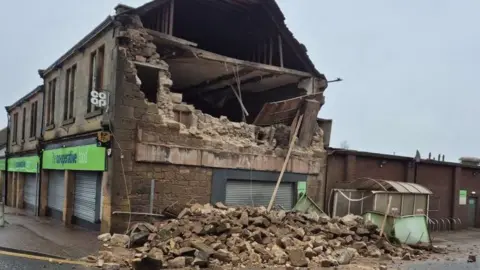
Forecasters had issued a rare red warning ahead of Eowyn's arrival and predicted the storm could be the most destructive to hit Scotland's central belt in 13 years.
The full extent of the damage is still being assessed but there were numerous reports of damaged buildings and infrastructure.
ScotRail said customers should not expect any trains to operate before 12:00 "at the very earliest" on Saturday.
The train operator said items found on the line included a trampoline, a sofa, shed roofs and wheelie bins.
Ferry operator CalMac said services would remain suspended until at least 10:00 while it carried out safety inspections.
The gable end of a Co-op store at Denny near Falkirk collapsed but there were no reports of injuries.
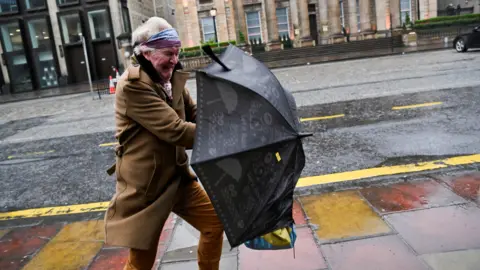 Reuters
ReutersCeltic Park was damaged and an inspection will take place on Saturday morning to determine whether the club's Scottish Premiership match against Dundee can go ahead.
In Inverclyde, Greenock Morton Football Club's Cappielow ground had sections of its roof ripped apart by the storm, while the roof of a leisure centre in Helensburgh was devastated by high winds.
Meanwhile, in Glasgow, a 400-year-old tree with connections to Mary Queen of Scots was severely damaged.
A number of branches on the Darnley Sycamore – said to be where Mary Stuart nursed Henry Stuart, Lord Darnley back to health after a long illness – were blown off during high winds.
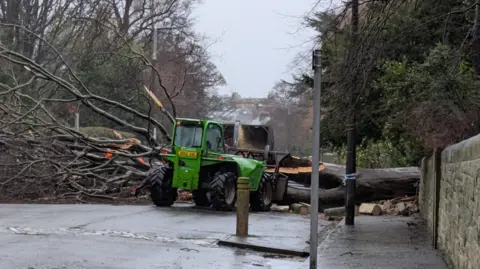
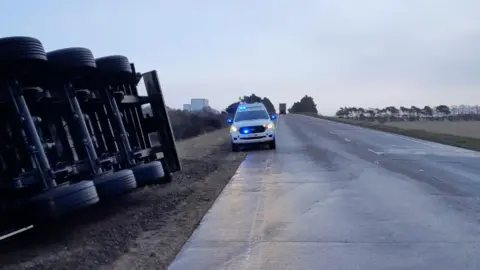 BEAR Scotland
BEAR ScotlandSepa issued a number of flood warnings for Tayside as well as for Ayr to Troon.
Network Rail, which has responsibility for the railway lines and stations, said its engineers would be working around the clock into Saturday.
Inspections were taking place as the winds subsided, but it warned significant recovery work would be needed before trains could run again.
Ross Moran, Network Rail Scotland route director, said: "This storm has caused extensive damage across Scotland's Railway bringing trees down onto the tracks and overhead powerlines and also damaging stations and other structures."
Edinburgh Airport suspended all flights for the duration of the red weather warning, and warned of continuing disruption on Friday evening.
One flight from London Stansted early in the day attempted to land several times before abandoning its approach and diverting to Cologne, Germany, about 762 miles (1,226km) away.
Glasgow Airport operated a limited service, while all but a handful of flights from Aberdeen Airport – which faced an amber warning – were cancelled.
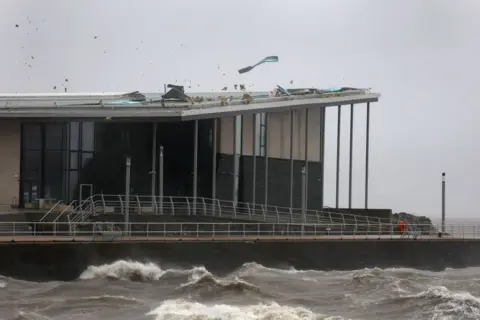 Getty Images
Getty Images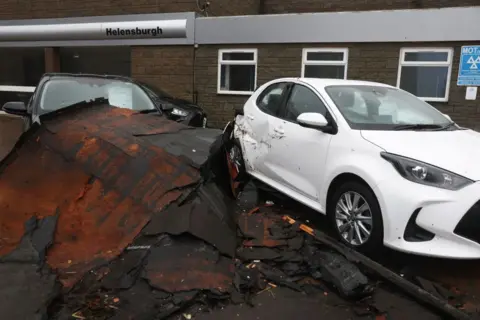 Getty Images
Getty Images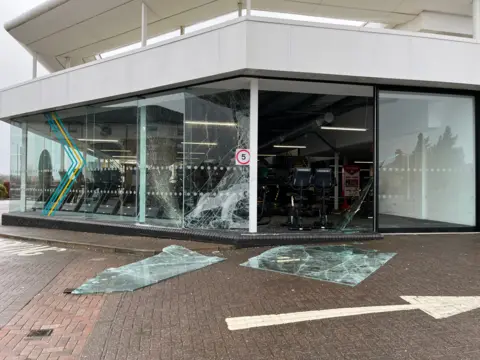
'Once in a generation' storm
The amber warning for wind continues until early on Saturday for northern Scotland.
There was also a yellow warnings for and ice which will affect the northern mainland and central belt into Saturday morning.
Snow will mainly be confined to high ground, above 200m, but accumulations of up to 5cm can be expected.
BBC Scotland weather presenter Judith Ralston said a storm of such severity was a very rare event.
"This is an intense storm - once in a generation if not rarer," she said.
